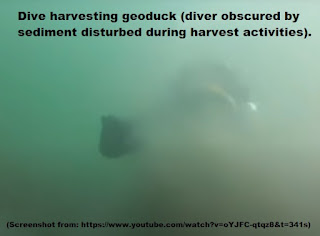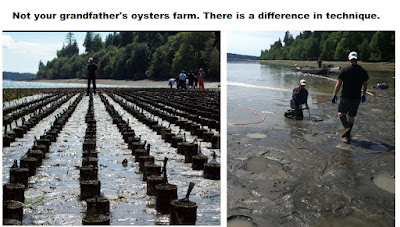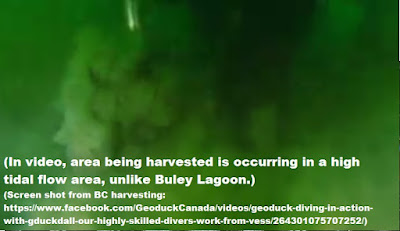Burley Lagoon Geoduck Farm: Gig Harbor Advisory Commission (PAC) votes to DENY Taylor Shellfish permit for a geoduck farm in Burley Lagoon.
(Summary of meeting follows)
Burley Lagoon in Pierce County
Example of what a geoduck farm looks like.

.
Taylor Shellfish has proposed up to 25 acres be converted.
May 24: At a meeting held May 24, after hearing testimony from Pierce County and Taylor Shellfish representatives, Gig Harbor votes against Taylor Shellfish's proposal for conversion of tidelands to a geoduck farm. While only advisory, the decision reflects strong local opposition to the proposal.
(A recording of the meeting may be found here - scroll to "Agendas and Documents", then click on "5 24 23 PAC Recording - Audio": https://www.piercecountywa.gov/5934/Gig-Harbor-Peninsula-Advisory-Commission)
Highlights:
Question - Was all 300 acres farmed? Taylor Shellfish claims all 300 acres have historically been farmed. Some question whether that is the case, or if the acreage actually farmed is less. Taylor claims the geoduck farm would represent "only" 8% of the Lagoon. If fewer than 300 acres was actually used, the percentage of tidelands impacted would grow dramatically.
Question - How long will harvesting take place? Taylor Shellfish noted harvesting would occur during low tides in the summer and dive harvesting would occur during winter.
Sediment disturbed during dive harvesting.
Question: How will this farm uphold the values reflected in the community plan? (focus on how the farm would uphold these values) The County responded there are subjective opinions but felt the EIS addressed these concerns, pointing out the EIS is being appealed.
Question: If, after 5 years, it was found that goals were not being met, what recourse is there? The County stated the Hearing Examiner might require the county to monitor complaints. While revocation of a permit is possible, it is a "heavy lift" and staff does not have a boat to run out on. Not liking how it looked sounded unrealistic to address.
Question: If the 25 acres is approved, what is the process should Taylor wish to expand to 50 acres? The County said Taylor has told them 25 acres is all they want. But, a permit revision for expansion is available, or possibly a new permit would be required. (It was noted past regulations are not what future regulations may be. There was no clear answer.)
Question: Isn't this just farmland? If so, aren't they also under the same sort of restrictions as upland farms (e.g., wetland setbacks)? The County said tidelands are different as the public use of waters is also involved, bringing up why it's so difficult to install a dock, touching on issues of the "Public Trust".
Question: Aren't tidelands taxed far less than upland parcels are? The County "did not know" (For readers unaware, tidelands are taxed at a fraction of upland parcels.)
Opinion: Farming is good, all farming creates monocultures, in short, a farm is a farm is a farm. Except this is taking place in a marine environment. The County responded that if an existing upland farm wanted to expand they too may be subject to new regulations.
Question: Has the County acted on citizen complaints about debris and operational hours? The County said Taylor has been responsive to complaints about noise and debris. No attempt at setting up mediation has occurred, but it may be worth considering. The County expects complaints to continue.
Statement: The County said limit hours of operation has been attempted in the past but shellfish companies do not like those restrictions. It's possible the Examiner may put something in place.
Question: Logging and forestry are restricted, isn't aquaculture? The County said not really because this area is an existing farm and much of it was established when there was no noise requirement. While there is a noise pollution ordinance, it is enforced by the Health Department and they do not have the staff. Theoretically, it's possible, but, there is a question of whether only the new 25 acres would be impacted.
Question to Taylor: How long has Taylor actively farmed the area? Taylor responded they begun leasing tidelands in 2012 and actively farmed since 2014.
Question to Taylor: Why change to geoduck now? The owner asked Taylor to change. Taylor's attorney's "recollection" is markets change and product demand changes, creating a need for "diversification" of the "portfolio", including the risk of disease. (Taylor's attorney again pointed out 25 acres is "only" 8% of the area.)
Question to Taylor: Aren't there other areas Taylor can use? Taylor's attorney responded yes, although the attempt to do so was simply a scattering of seed in the water, both within and outside of the Lagoon.
Question to Taylor: If scattering is successful, why the need for PVC tubes and netting? Predation is too high and survival too low without PVC tubes and netting.
Question: Have all of Taylor's permit applications been approved? The County responded yes, pointing out his is the possibly the largest of all applications. (One in a subtidal area, the "Detienne" farm, was ultimately denied.
Comment: The County noted other agencies are involved in permitting.
Question: Is this site typical in proximity to residential surroundings? The County responded that most are on exposed tidelands, but not similar to a lagoon such as Burley Lagoon. "This one is different." In part it was why an Environmental Impact Statement was required.
Question: Are aware if any areas where upland owners are compensated? The County noted again that Burley Lagoon is different in that there is a high density of development and use, again pointing out his was why an EIS was required.
Question: Did past applications have existing farms? The County responded that most did not.
Question: What is the County's take on the reduction in property values as farming increases? The County has said no reduction in property values has occurred, that they know of. The County could not say clearly what they would need in order to be convinced property values do become lower, although independent appraisers might be helpful. Taylor's attorney had recollections of the Haley farm testimony being experts having differing opinions and the examiner not acting on it.
Question: How would the County address a "taking" if property values decreased? It was no known, but the EIS did attempt to address probable significant adverse issues, and property values was not one of the issues. The questioner responded that many of the community members, who she spoke for, does have concerns.
Question: What was the County's involvement in the creation of an EIS? The County provided issues, responses were made, more issues were brought up, more information was provided, in short, that the County was involved from the beginning.
Question: Because of the involvement, does the County agree there is no net loss from whatever base line is established? The County agreed, pointing out, no net loss is not the same as no impact, and why mitigation may be required.
Question: Did the County have any input into who the consultant creating the EIS was? The County discussed the amount of time Dave and Ty have spent on previous permitting questions. Many of those past actions have presented consultants who were involved in the EIS's creation, but the County did not chose them. The County pointed out the applicants do chose the consultants and every EIS has had complaints about bias.
Question: With the change in tideland use, is there any mitigation in place to offset the changes which will occur? The County said there were things required, but visual issues were important, but they were unclear about what requirements there may be to minimize the visual impact, pointing out the subjectivity of it.
Opinion: Many people don't find PVC pipes in the tidelands very appealing.
Question: What is the grandfathered use of tidelands in the past? The County was not clear, but that there were many letters describing exactly what was taking place, disagreeing with the statements of past use. The question of expansion/intensification was addressed years ago, but there was no clear answer beyond having to go re read the letters again.
Question: If shellfish were being grown in the past, where is the line between one shellfish species and another? The County responded the means and methods used to grow geoduck are very different than how clams/oysters are grown and harvested.
Opinion: Silt and sediment and water create a large disturbance within Burley Lagoon. The County determined only a "moderate" impact would occur, and why in part, an appeal of the EIS has occurred.
Dive harvesting disturbs large volumes of sediment.
Final comments: It's a farm; it does not fit within the community plan; nets are a navigational hazard; it's unique but geoduck are grown differently and property rights of upland property owners are as important as tideland owners; there won't be less geoduck for sale at Safeway if this does not go in; hours of operation should be put in place; it's an estuary with two important creeks; selling farm products to China make money; residential and aquaculture have competing interests; we're not taking aquaculture away from Taylor as they may continue to grow oysters and clams as they have; products sold overseas may benefit a few economically, but not the general population; environmental protection and sustainable practices are important to the advisory commission; changing the nature of the Lagoon and what the Lagoon has become is an important aspect; is selling natural resources overseas what the US really wants
Motion to DENY approval the permit as requested: Motion carried (i.e., DENIAL of approval).







